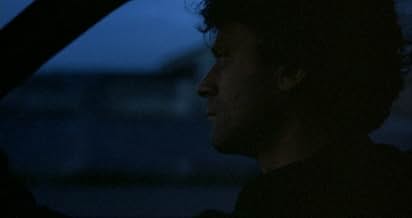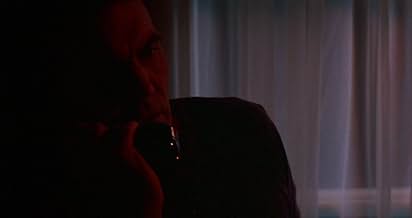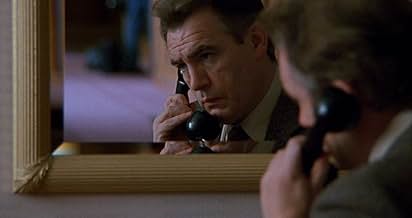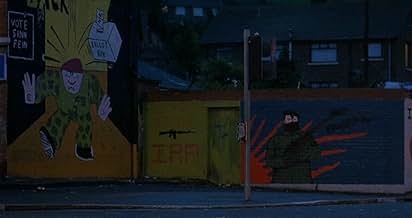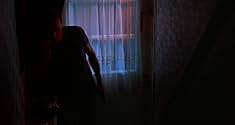NOTE IMDb
6,9/10
5 k
MA NOTE
Ajouter une intrigue dans votre langueWhen an American human rights lawyer is assassinated in Belfast, it remains for the man's girlfriend, as well as a tough, no nonsense, police detective to find the truth.When an American human rights lawyer is assassinated in Belfast, it remains for the man's girlfriend, as well as a tough, no nonsense, police detective to find the truth.When an American human rights lawyer is assassinated in Belfast, it remains for the man's girlfriend, as well as a tough, no nonsense, police detective to find the truth.
- Réalisation
- Scénario
- Casting principal
- Récompenses
- 2 victoires et 3 nominations au total
Avis à la une
"Hidden Agenda" was an enjoyable political thriller. The story was a somewhat typical Irish against the bloody English set in the late 1980's. The strength of the movie was in the fine acting by Frances McDormand, as usual, Brian Cox and many others. The ending some may find unsatisfactory. It tends to be open ended. I thought it provided much speculation on what Frances McDormand would do. I also thought it to be true to life.
Ken Loach has made a career out of directing movies about politically charged topics. A lot of his movies have addressed class issues in the United Kingdom, but he has also looked at foreign policy. One example is "Hidden Agenda", about an investigation into the murder of a human rights lawyer in Belfast. Loach not only indicts the British occupation, but also finds time to take a swipe at Margaret Thatcher's government.* While I was watching the movie I assumed that it was based on the murder of solicitor Pat Finucane. It turns out that the movie is a fictional story, but it still makes sure to show the sorts of things that had become commonplace in Northern Ireland. I read that Loach had the cast members meet with people who had gotten abused by British forces to give them an idea of what the movie was dealing with.
Ken Loach also looked at Ireland in "The Wind that Shakes the Barley", about Ireland's war for independence in the early 20th century. Both movies take unflinching looks at what the English did to the Irish for over 800 years. To be certain, "Hidden Agenda" features a scene that should give people pause in the era of the so called war on terrorism: a man sings a song that has the line "you take our land and call us terrorists for resisting". I recommend the movie. Other movies focusing on Northern Ireland that I recommend are "In the Name of the Father", "Bloody Sunday" and "Breakfast on Pluto".
*After Thatcher died, Loach proposed that her funeral should be privatized, since she would've wanted it that way.
Ken Loach also looked at Ireland in "The Wind that Shakes the Barley", about Ireland's war for independence in the early 20th century. Both movies take unflinching looks at what the English did to the Irish for over 800 years. To be certain, "Hidden Agenda" features a scene that should give people pause in the era of the so called war on terrorism: a man sings a song that has the line "you take our land and call us terrorists for resisting". I recommend the movie. Other movies focusing on Northern Ireland that I recommend are "In the Name of the Father", "Bloody Sunday" and "Breakfast on Pluto".
*After Thatcher died, Loach proposed that her funeral should be privatized, since she would've wanted it that way.
Largely forgotten today, the first of two films Ken Loach made about The Troubles generated headlines at the time for a nasty spat at a press conference between Alexander Walker and Loach. As the snappy title suggests it's the nearest thing Loach ever made to a conventional thriller, and although Loach is no Costa-Gavras or Alan Pakula it hold the attention.
Loach inevitably subscribes to the conspiracy rather than the cock-up theory of history, witness the speech that Thatcher's elevation was deliberately engineered rather than simply luck; and he puts a crass and patronising observation about the Irish in a high-ranking Tory's mouth.
A good cast rather surprisingly includes Mai Zetterling making a rare late appearance as an actor in a oddly small part.
Loach inevitably subscribes to the conspiracy rather than the cock-up theory of history, witness the speech that Thatcher's elevation was deliberately engineered rather than simply luck; and he puts a crass and patronising observation about the Irish in a high-ranking Tory's mouth.
A good cast rather surprisingly includes Mai Zetterling making a rare late appearance as an actor in a oddly small part.
Hidden Agenda (1990) is a somewhat enjoyable political cover-up drama about the Northern Ireland conflict (the troubles). Starring Brian Cox and the ever wonderful Frances McDormand. Somewhat enjoyable is about as good as it gets though sadly. Very interesting history and plot, well written and well acted but drawn-out and one sided.
Whooaa! Slow down, sol1218 from Brooklyn NY.
The political scene in the U.K. looked like this: Edward Heath, bachelor leader of the Conservatives, won the election in 1970. He took Britain into the then Common Market in 1973, but called an election in February 1974 when the miners forced him to declare a three-day week.
The Tory slogan for the election was: Who governs Britain? The result was confused, but the message was fairly clear: Not you, matey. Labour under Harold Wilson took office with a slim majority. Wilson called a second election in October, which he won narrowly, increasing his majority slightly.
He held a referendum on the Common Market in 1975, which he won by sidelining the extremists of both Left and Right. He ruled until 1976 when he resigned from politics, for reasons which were obscure at the time, but probably because he had been diagnosed with Parkinson's. It is certainly true that the Right plotted endlessly against him.
Jim Callaghan, who had been Chancellor, Home Secretary and Foreign Secretary, took over as P.M. and called an election after his full five-year term. (In the U.K. governments normally call elections after four years.) In fact Callaghan was forced to do so because of a move by the Scottish Nationalists. Had he called the election just a year earlier, he stood a good chance of winning, say many pundits.
Meanwhile, the Conservatives had deposed Edward Heath who had lost them two elections, and Maggie Thatcher replaced him as leader. She swept to power in 1979, and as we all know, won the next two elections.
Economic chaos was the watchword of the day and there were many strikes. The situation in Northern Ireland, which had started simmering with the Civil Rights movement of 1968, gradually deteriorated. The assassinated politician of the film whose name is Nevin, may well represent Airey Neave, a war hero who had escaped from the high-security Colditz Castle, a German-speaking lawyer who had attended the Nuremberg Trials and a hardline Conservative with military and security connections, who was a close adviser of Thatcher. He was blown up outside the House of Commons on March 30, 1979, by the INLA a few weeks before the election.
Ken Loach has never made any secret of his sympathies for the Irish cause. His powerful film "Wind that shakes the barley", which apparently did not make much money in the U.K., had Conservative politicians fulminating about treason and lack of patriotism because of his portrayal of the brutal Black and Tans. The name was given to the ex-British army personnel and (inaccurately) also to the auxiliaries who were sent to Ireland between 1920 and 1921 to crush the IRA and Sinn Fein, but who also attacked and killed civilians. Historians agree, however, that Loach was pretty accurate in his historical recreation. The film also shows the ruthlessness of Irish-on-Irish killings in the Civil War afterwards.
The political scene in the U.K. looked like this: Edward Heath, bachelor leader of the Conservatives, won the election in 1970. He took Britain into the then Common Market in 1973, but called an election in February 1974 when the miners forced him to declare a three-day week.
The Tory slogan for the election was: Who governs Britain? The result was confused, but the message was fairly clear: Not you, matey. Labour under Harold Wilson took office with a slim majority. Wilson called a second election in October, which he won narrowly, increasing his majority slightly.
He held a referendum on the Common Market in 1975, which he won by sidelining the extremists of both Left and Right. He ruled until 1976 when he resigned from politics, for reasons which were obscure at the time, but probably because he had been diagnosed with Parkinson's. It is certainly true that the Right plotted endlessly against him.
Jim Callaghan, who had been Chancellor, Home Secretary and Foreign Secretary, took over as P.M. and called an election after his full five-year term. (In the U.K. governments normally call elections after four years.) In fact Callaghan was forced to do so because of a move by the Scottish Nationalists. Had he called the election just a year earlier, he stood a good chance of winning, say many pundits.
Meanwhile, the Conservatives had deposed Edward Heath who had lost them two elections, and Maggie Thatcher replaced him as leader. She swept to power in 1979, and as we all know, won the next two elections.
Economic chaos was the watchword of the day and there were many strikes. The situation in Northern Ireland, which had started simmering with the Civil Rights movement of 1968, gradually deteriorated. The assassinated politician of the film whose name is Nevin, may well represent Airey Neave, a war hero who had escaped from the high-security Colditz Castle, a German-speaking lawyer who had attended the Nuremberg Trials and a hardline Conservative with military and security connections, who was a close adviser of Thatcher. He was blown up outside the House of Commons on March 30, 1979, by the INLA a few weeks before the election.
Ken Loach has never made any secret of his sympathies for the Irish cause. His powerful film "Wind that shakes the barley", which apparently did not make much money in the U.K., had Conservative politicians fulminating about treason and lack of patriotism because of his portrayal of the brutal Black and Tans. The name was given to the ex-British army personnel and (inaccurately) also to the auxiliaries who were sent to Ireland between 1920 and 1921 to crush the IRA and Sinn Fein, but who also attacked and killed civilians. Historians agree, however, that Loach was pretty accurate in his historical recreation. The film also shows the ruthlessness of Irish-on-Irish killings in the Civil War afterwards.
Le saviez-vous
- AnecdotesThe 'Six Irishmen,' mentioned by Sir Robert Neil of MI5 (with politician Alec Nevin) to Kerrigan is in reference to the 'Birmingham Six.' In 1974 the pub Tavern In The Town and Mulberry Bush, in Birmingham England, was bombed, killing 21 persons and injuring 182 people. The police picked up the nearest six Irishmen and subjected them to 'in-depth interrogation' to obtain false confessions. Patrick Hill, Gerard Hunter, Richard McIlkenny, William Power, John Walker and Hugh Callaghan all served 16 horrific years in jail until the convictions were overturned in 1991. Hugh Callaghan details his ordeal in the book, *Cruel Fate,* co-authored with Sally Mulready in 1994-1995. The movie Au nom du père (1993), was based on the Guildford Four, who were similarly jailed using false confessions, along with members of their extended family living in London. That's how the Brits induced Gerry Conlon, Daniel Day-Lewis' character, to confess, by throwing his father, aunts, uncles, and cousins in jail, too. Members of the Guildford Four ordeal were released in 1989 and 1991, where illegal police tactics and hidden evidence were brought to light. The appeals trials of the Guildford Four paved the way for the release of the Birmingham Six, who were in jail longer, and their pleas for appeals were ignored, and never heard until after the Guildford Four / Conlon Family convictions were finally thrown out. All of the innocent Birmingham Six and Guildford Four were still in jail at the time this movie was released.
- Citations
Sir Robert Neil: You know Ireland can be a wonderful place... if it wasn't for the Irish!
- Bandes originalesJoe McDonnell
Written by Brian Warfield
Re-arranged by Ron Kavana
Performed by Ron Kavana and Terry Woods
Published by Skin Music
Meilleurs choix
Connectez-vous pour évaluer et suivre la liste de favoris afin de recevoir des recommandations personnalisées
- How long is Hidden Agenda?Alimenté par Alexa
Détails
Box-office
- Montant brut aux États-Unis et au Canada
- 1 030 938 $US
- Week-end de sortie aux États-Unis et au Canada
- 49 827 $US
- 25 nov. 1990
- Montant brut mondial
- 1 232 210 $US
- Durée1 heure 48 minutes
- Couleur
- Mixage
- Rapport de forme
- 1.85 : 1
Contribuer à cette page
Suggérer une modification ou ajouter du contenu manquant

Lacune principale
By what name was Hidden Agenda - Secret défense (1990) officially released in India in English?
Répondre

